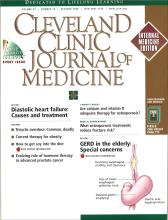ABSTRACT
Gastroesophageal reflux disease poses special diagnostic and therapeutic challenges in the elderly. These patients may not report the classic symptoms of dysphagia, chest pain, and heartburn, and they are more likely to develop severe disease and complications such as esophageal ulceration and bleeding. Therapeutic options include lifestyle changes, medication, and surgery. Polypharmacy and changes in renal, hepatic, and gastrointestinal function can complicate treatment. Proton pump inhibitors can help optimize disease management.
- Copyright © 2000 The Cleveland Clinic Foundation. All Rights Reserved.






